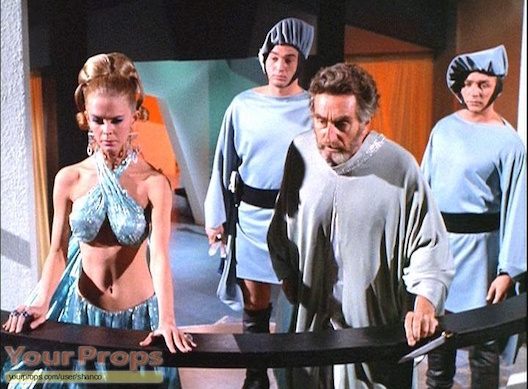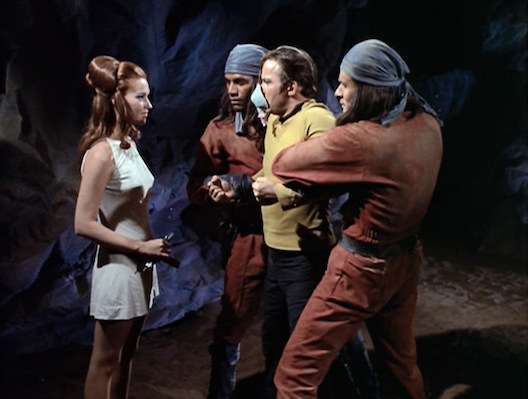VANNA: “Until we have help in the mines and our homes are in the clouds.”
KIRK: “That's quite a while.”
- ’The Cloud Minders’
By the late Sixties we’d seen youth revolt, black liberation, women’s liberation... even (by the June 1968 Stonewall riot, shortly after ‘Star Trek’ finished) gay liberation. And what’s missing from this picture? Unrest, great to see you. But you have no class.
In fact there‘d been a sharp increase in strikes throughout the Sixties, by the decade’s close hitting a peak only exceeded by the Forties/ early Fifties. Class issues may have been absent from media representation, but not life on the ground. And perhaps that’s not surprising. The one thing capitalism is most reliant upon is a class system, which is to say on a majority which does most of the work while getting the least of the benefits. Yet there’s one ’Trek’ episode which touches on this subject - ’The Cloud Minders’. And if one swallow does not a Summer make, maybe it could do us for a bit of a Spring.
Third season episodes such as this frequently suffered death by rewrite. Yet, interestingly, Josh Marsfelder claims that it was when David Gerrold’s original script was rewritten, by Oliver Crawford and Margaret Arman, that it transformed from a polemic on slavery into a more relevant account of wage labour. He calls it “unfiltered Marxism on primetime television”. And indeed, when accused of negotiating via force, rebel leader Vanna replies flatly that it’s “the only way we can obtain what is due us”. You know, a bit like how it works in real life.
Dating back to ’Gulliver’s Travels’ cloud cities are one of those recurrent SF concepts which are great eye candy while making no sense whatsoever. Why would anyone think of sticking a city on a cloud? Especially while there still seems no shortage of that rather firmer-looking ground stuff. But this story does at least find a symbolism in them...
Stratus is divided between the highminded cloud city dwellers and the mine-labouring Troglytes, as if only penthouse and basement. The mine contains a mind-numbing gas which all the Troglytes inevitably imbue. If that seems remarkably like a metaphor for false consciousness, check this exchange between Vanna and Kirk. When Vanna scoffs “It’s hard to believe something which is neither seen nor felt can do so much harm”, Kirk replies “but an idea can’t be seen or felt. That’s what’s kept the Troglytes in the mines all these centuries, a mistaken idea.”
And unlike the magic sign-revealing sunglasses of Carpenter’s ’They Live’ (1988), it’s closer to false consciousness as it actually works. The Trogyltes are neither seduced by cunningly crafted lies nor duped by subliminal commands. In fact the city dwellers are themselves unaware of the gas’s existence. It’s social conditions themselves which limit our consciousness. (It was some old bloke with a beard who first said that, I forget his name now.)
This is admittedly applied in a crudely deterministic way. Trapped in their underground labours, unable to see the expanse of the sky, their horizons are quite literally limited. There’s even a literal fix, the gas-blocking filter masks Kirk wants everyone to wear which does stray back towards Carpenter’s cool-outsider sunglasses. But then again, making things clear-cut is pretty much the point of a metaphor. So far, things do seem pretty Marxist.
But then you might expect the gas, whose effects Kirk describes as “retardation and emotional difficulties”, to keep the Trogyltes passive and docile – in essence, as cattle. Instead it makes them surly and aggressive. In other words it accentuates the characteristics of being working class that we see in the popular stereotype - dim, monosyllabic, quarrelsome. There’s the reactionary but widespread association between the working class and alcoholism, which goes back at least to Hogarth’s prints and continues today in the popular bete noire of the mouthy chav clutching his tinny. And it seems scarcely a coincidence that the gas so closely duplicates the effects of alcohol. In short the Troglites are oiks, semi-rational brutes.
High Advisor Plasus insists that problems are down to the Disruptors, “a small group of Troglyte malcontents” yet “all the other Troglytes are completely dominated by them.” Which sounds an unsquareable circle, and by this stage we’ve already learnt not to trust him. Yet as the episode pans out, it turns out to be an understatement. As far as we see there’s really just one Disruptor, Vanna. An ex-servant she’s mostly lived in the city, away from the gas. And as their token representative of non-dumbness she naturally takes charge.
When Troglyte henchman Midro threatens to kill the captured Kirk she points out “a dead hostage is of no value.” Not the hardest to grasp of notions, but she only seems able to enforce this notion by pulling rank – “I will say what is to be done”. (What’s the word again for people who talk like that? I don’t think it’s Disruptor.) She refers to him disparagingly as “a child.” His desire to kill Kirk seems no more than a desire to gratify his immediate senses. He cannot do that thinking-ahead thing, he needs Vanna for that.
Then in a final fight between Kirk and Plasus, Vanna is left with a choice of going for Kirks’ phaser or communicator. Despite her clear earlier preference for the phaser as an effective negotiating tool she grabs the communicator - to ask the Enterprise for help. In the final scene she’s shown beginning to negotiate with Plasus.
To get this we need… you guessed… some context. In the Sixties, Trade Union membership was still high. But its mainstay was skilled, professionalised and in most cases white workers. Whereas the more recent rise in unrest had come from unskilled and casualised workers, those who had it worst. Often black themselves, they were influenced by the more radical methods of black liberation. (The overlap between civil rights campaigning and labour struggles was huge, and has since been almost entirely airbrushed out of the official narrative.)
Sometimes they formed their own groups outside of official unionism, such as the Dodge Revolutionary Union Movement. But mistrust of the mainstream unions was more general. During this time, increasing numbers of union-recommended offers were rejected by workers.
And so an inevitable feature of official unions came to the fore. As Sharon Smith has said “in many cases, management came to rely on union officials to ‘police’ the workforce - that is, to enforce productivity rates and shop floor discipline.” (Yes, that’s from the accursed and contemptible ‘Socialist Worker’, but the article itself is largely accurate.)
And it’s in this context that we should see Vanna’s choosing the communicator. In ‘Way To Eden’ Severin, the messianic leader, had to be written out so his more reasonable followers could be brought on board – Learyites without that troublesome Leary. When it’s workers it’s the opposite way up - the story which first flirts with the bog-standard rhetoric about outside agitators then flips back again.
There’s no reasoning with those sullen Troglytes, masks or not. But thankfully we have Vanna as our go-between. Where workers have legitimate grievances they should raise them the right way, through the proper channels. Vanna rejects Kirk’s filter mask only to become one; she turns into the voice of responsible unionism, forceful in negotiation but making only reasonable demands, keeping more disreputable elements in check. Class difference is fine, the problem only arises when those classes get too far apart. ’The Cloud Minders’ is neither filtered nor unfiltered Marxism, but a very necessary filter placed upon the face of Marxism in order to muffle it.
And there’s more… As with ‘Last Battlefield’, the problem with symbolising an issue by means of assigning a planet to it is that this can also externalise it. And as with ‘Last Battlefield’, this is played into. Racism, class prejudice – they’re things outside of me and you, done by people we watch without identifying with. And the look of Stratos is unmissably retro, it’s city in the clouds hearkening back to the days of pulp magazines. Think, for example, of the celebrated ‘Metropolis’ (1927). The upper city dwellers swan about in cloaks, admiring art, recalling the division in Ancient Greece between citizens and slaves.
In other words, Stratos is another degenerate European civilisation. This is the classic American cultural trope of pushing the issue of class back onto Europe. There was an absence of overt social deference, as there’d been in the old world. When the outer trappings of class went, the top hats and monocles replaced by jeans, surely class went too.
And, as so often with this trope, a very particular form of class is being used. Stratos, referring to a type of cloud, may seem a fitting name. But it is also associated with the term stratified. And effectively Stratos has no surface, at least not one anyone lives on. It is underground and sky, with no messing with Mr Inbetween – planetary upstairs downstairs. If Crawford and Arman did drag forward a script about slavery, they really only took it as far as a kind of serfdom.
In an echo of ’Metropolis’ even the younger generation have come to question, with Plasus’ daughter Droxine asking “Father, are we so sure of our methods that we never question what we do?” By the end she’s decided. “I shall go to the mines. I no longer wish to be limited to the clouds.”
But overall it becomes Kirk’s job becomes to bring this retro world up to the present. He and Spock first land on the planet’s uninhabited surface, like that’s where they naturally gravitate to. It’s nominally a member of the Federation, but because they’ve been kept unaware of how the Troglytes are being treated. Spock believes “all forms of violence have been eliminated”, as if this is all kept a guilty secret. A fundamental piece of ’Star Trek’ lore is thereby preserved, the solutions to the problems of the Old World all lie with the New.




No comments:
Post a Comment